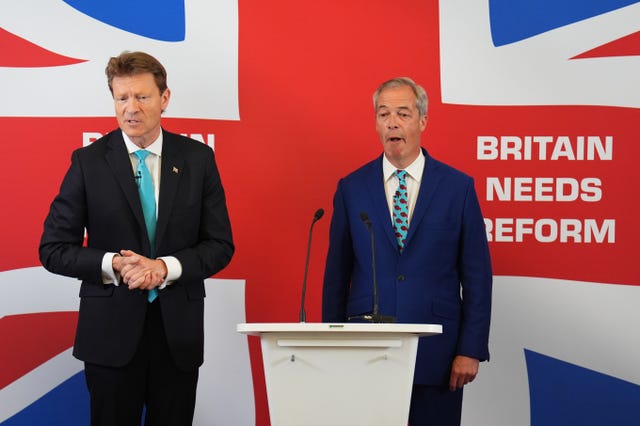Reform candidate says UK should have ‘taken Hitler up’ on neutrality
‘Every party will suffer’ from candidate controversy because of the speed of the election, Reform UK leader Nigel Farage has said.

All parties will have controversial General Election candidates, Nigel Farage said, after it emerged that a Reform contender had said that Britain should have “taken Hitler up on his offer of neutrality”.
The Reform UK leader said the short notice at which the election was called meant that his party’s vetting programme had run out of time.
After an announcement about economic policy in Westminster, Mr Farage was asked about Ian Gribbin, the party’s candidate in Bexhill and Battle, who has said that Britain should have “taken Hitler up on his offer of neutrality” instead of fighting the Nazis in the Second World War.
He is also reported to have said that women were the “sponging gender” and should be “deprived of health care”.

Mr Farage said: “They’ve got a bigger problem in the Green Party. They’ve had to suspend 20 of their candidates for putting out pretty vile antisemitic tweets.
“Here’s something, I think every party will suffer because it was a snap election. We’ve put in place a good vetting programme, but we’ve run out of time.”
Party chairman Richard Tice added: “We’re really pleased with all candidates. When people do inappropriate things, say daft things, then of course we’ll look at it and investigate it and that’s what we do.”
Veterans’ minister Johnny Mercer said the comments from Mr Gribbin were “shameful” and showed “a shocking lack of judgment”.
The Conservative said: “These comments ignore the millions murdered by the Nazis in their bid for European domination and the ultimate sacrifice paid by the men and women who stood up to Hitler in our darkest hour.
“Misusing appeasement to justify Nazi apologism is disgraceful and comments like this are deeply troubling coming from a political party.”
Despite ruling out standing as a candidate just a few weeks ago, Mr Farage said his party is now the “challenger for Labour”.
He said: “Yes, we’ve got a long way behind in London. Yes, we’ve got a long way behind in Scotland, but actually, in significant parts of the country we are now the challenger for Labour.”
He also said Reform is polling at 17%, and disputed polls showing lower figures, as he referred to the “debanking” row, where he claimed he had been denied access to a bank account because of his political views.
He added: “We’re closer to a very big breakthrough than some of those disreputable opinion polls in yesterday’s Sunday newspapers tried to imply.
“I have written to Professor Green, head of the British Polling Council, and I very much hope that the polling industry becomes honest.
“Otherwise, I’ll have a fight with them, like I had a fight with the banks last year, I can’t wait. It’s up to them, it really, really is.”
As they announced their flagship economic policy of raising the minimum income on which people would pay income tax, party chairman Richard Tice said: “The British taxpayer is being suffocated by record peacetime taxes.”
Reform says this would take seven million people out of income tax, at a cost of £40 billion a year, which they would fund by ending the Bank of England’s payment of interest on printed money reserves.
Mr Farage was also asked if the dip in the euro after the success of Eurosceptic nationalist parties in the European elections showed that the market would not respond well to a strong Reform performance in the election.
He said: “I would have thought if Reform won the election the markets would sky rocket.”
He added: “I would have said that some people that actually understand how humans operate, when they give them the freedom to do so, will be a very, very good thing.
“I think on the broader point on what those elections show is, ultimately, one of the reasons for leaving the European Union was realising that it can’t survive.
“It won’t survive, it will probably come to a very ugly end and so I’m pleased that we’ve had the great escape.”





